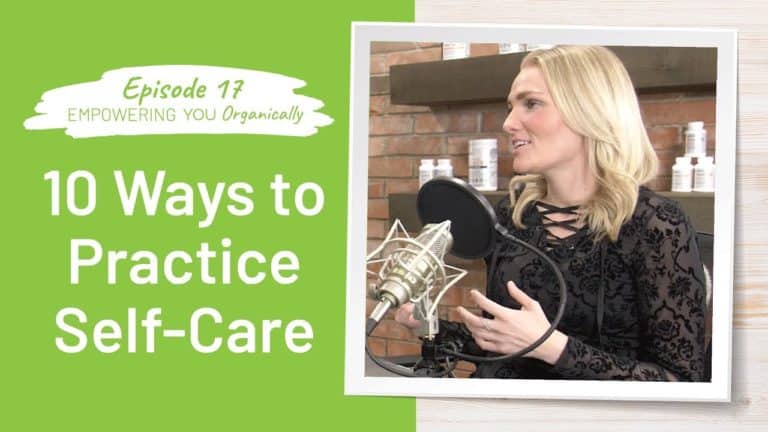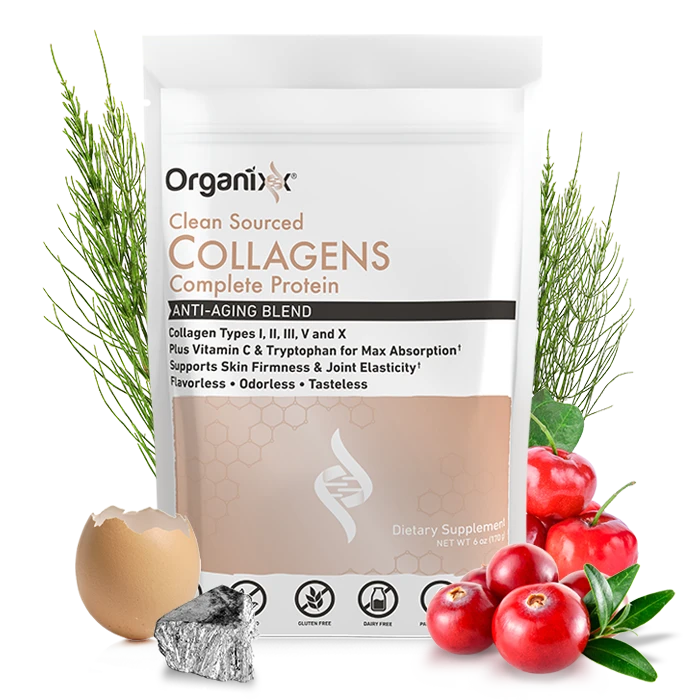Empowering you Organically – Season 3 – Episode 17
Title: 10 Simple Ways to Practice Self-Care
Hosts: Jonathan Hunsaker & TeriAnn Trevenen
Guest: N/A
Description: We’re continuing our L.O.V.E. theme! Listen as we deep dive into self-care. Once you understand why it matters you will view self-care in a new light.
What is self-care exactly? It’s not just a trip to the spa! Learn how to slow down and really connect with yourself is a healthy way and tap into your inner healing. We share a list of 10 Ways To Implement Self-Care Daily on this episode.
We also discuss the myths we all tell ourselves to avoid self-care. Drop the guilt and learn what other myths keep you from providing yourself the self-care you need.
* * *
FEATURED PRODUCT
Powerful Proteins Help Smooth Wrinkles, Keep Skin Plump, and Promote Joint Health
- FOUR COLLAGEN SOURCES: We’ve combined collagen types I, II, III, V and X – the major types of collagen your body needs – from four different sources (grass-fed cows, wild-caught fish, antibiotic-free chicken, eggshell membrane) for the ultimate matrix of health benefits.
- HIGHLY BIOAVAILABLE: Clean Sourced Collagen is formulated with VItamin C, Horsetail Extract and Zinc for maximum absorption.
- EASY TO TAKE: Our revolutionary, odorless, tasteless, and easy-to-mix Clean Sourced Collagens can be added to a wide variety of healthy foods or mixed into water, juice, or your favorite smoothie.
- NATURAL INGREDIENTS: We only use the purest ingredients found on Earth and our supplements are free from artificial flavors, preservatives, colors, yeast, soy protein, sodium, starch and are non-GMO.
* * *
What is Self-Care?
self-care/selfˈker/
noun: self-care; noun: selfcare
1. the practice of taking action to preserve or improve one’s own health
2. the practice of taking an active role in protecting one’s own well-being and happiness, in particular during periods of stress
- Self-care is any activity that we do deliberately in order to take care of our mental, emotional, and physical health.
- Although it’s a simple concept in theory, it’s something we very often overlook.
- Good self-care is key to improved mood and reduced anxiety.
- It’s also key to a good relationship with oneself and others.
What Self-Care Is Not
- Knowing what self-care is not might be even more important. It is not something that we force ourselves to do, or something we don’t enjoy doing.
- Self-care is “something that refuels us, rather than takes from us.”
Why Self-Care Matters
- Stress is a toxin to your body. Science has now proven “chronic stress may also cause disease, either because of changes in your body or the overeating, smoking and other bad habits people use to cope with stress. Job strain — high demands coupled with low decision-making latitude — is associated with increased risk of coronary disease, for example”.
- Chronic stress adds to the Cortisol overload in your body as well. If your Cortisol levels are off the charts it’s difficult release excess weight. Plus, elevated Cortisol levels have negative effects on your other hormones swimming around inside making it hard to get proper rest or even relax.
- Remember that self-care is not optional, it’s essential.
Bust Your Myths Around Self-Care
- You feel guilty taking time for you. – This one is huge for people, especially women. You cannot serve from an empty well. If you don’t fill the well there is nothing to give, which of course leads to more stress and guilt.
- You don’t have time. – This is an overused line, isn’t it? I tell people ‘there’s no such thing as Time, it is a figment of your imagination.’ While not necessarily true in the literal sense, it does hold truth. We are the Master of our time not the other way around.
- You don’t know how. – Ok, now this one should be a huge red flag if you tell yourself this. Why? Because it is a strong indicator that you aren’t in touch with You. You’ve lost sight of your deepest wants, needs and desires. It’s time to get reacquainted with You. Start digging deep to uncover You again.
- Fear of doing something you truly love. Allowing other people’s thoughts and feelings and criticisms to affect us, and to affect the decisions that we make in life.
10 Ways To Implement Self-Care Daily
- Create a “no” list, with things you know you don’t like, or you no longer want to do. Examples might include: Not checking emails at night, not attending gatherings you don’t like, not answering your phone during lunch/dinner.
- Promote a nutritious, healthy diet.
- Get enough sleep. Adults usually need 7-8 hours of sleep each night.
- In contrast to what many people think, exercise is as good for our emotional health as it is for our physical health. It increases serotonin levels, leading to improved mood and energy. In line with the self-care conditions, what’s important is that you choose a form of exercise that you like
- Follow-up with medical care. It is not unusual to put off checkups or visits to the doctor.
- Use relaxation exercises and/or practice meditation. You can do these exercises at any time of the day.
- Spend enough time with your loved ones.
- Do at least one relaxing activity every day, whether it’s taking a walk or spending 30 minutes unwinding.
- Do at least one pleasurable activity every day; from going to the cinema, to cooking or meeting with friends.
- Look for opportunities to laugh!
Other Ideas to Spark Inspiration….
- Take time to identify the activities and actions that make you feel good.
- Find somewhere quiet and meditate as needed.
- Reread one of your favorite books.
- Avoid triggers.
- Watch shows that are funny or comforting.
- Take time to yourself, away from others.
- Get a full night’s sleep regularly.
- Check in with yourself.
- Put on fresh, comfortable clothing.
- Light a candle and fill your home with your favorite scent.
- Take a hot bath.
- Visit your favorite spot in the city you live in.
- Don’t feel guilty turning down invitations or canceling plans.
- Take a day off of work if you need to.
- Write down a list of things you are thankful for.
- Remind yourself that this too shall pass.
- Read inspiring quotes.
- Spend time outside.
- Listen to your favorite band or song on repeat.
- Ask for help if you need it.
- Do not force yourself to do anything you don’t want to do.
- Eat a balanced diet, but treat yourself to your favorite guilty pleasure.
- Write down what you’re thinking and feeling.
- Breathe in and out.
- Unplug from social media.
- Listen to a calming playlist.
- Pet an animal.
- Do yoga.
- Turn off your phone for a day.
- Splurge a little.
- Schedule an appointment with a therapist.
- Watch your favorite movie or TV show from childhood.
- Take a nap.
- Do something that inspires and motivates you.
- Make future plans for a trip or event you’re excited about.
- Spend time with a close friend or family member.
* * *
Subscribe to Empowering You Organically
Never miss an episode!
APPLE PODCASTS SPOTIFY GOOGLE PODCASTS
–
Episode 17 – 10 Simple Ways to Practice Self-Care






